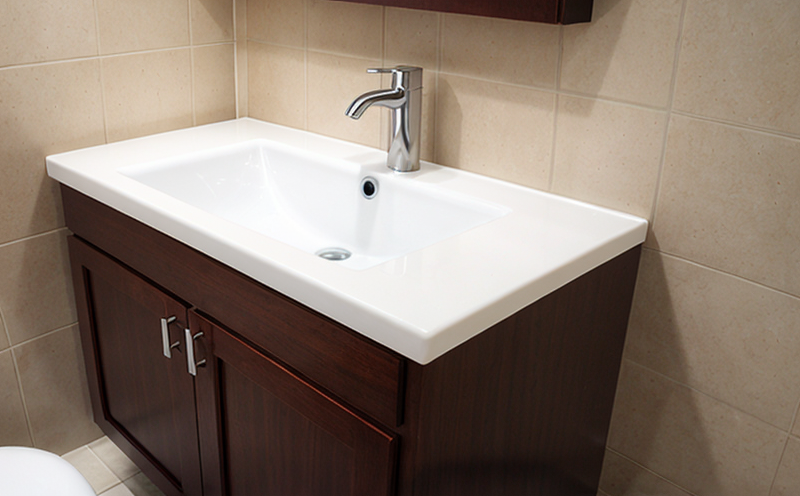NF EN 1811 Migration Testing of Bathroom Plastics with Metallic Coatings
The NF EN 1811 standard is a critical piece in the safety and quality assurance framework for plastics used in bathroom and sanitary applications. This testing ensures that any potential migration of harmful substances from the plastic to the surrounding environment or user is minimized, thereby protecting consumer health and safety.
Bathroom platics with metallic coatings often incorporate additives such as antioxidants, stabilizers, and pigments. These materials can potentially migrate into products like toiletries, water, or even air if not tested according to stringent international standards. NF EN 1811 addresses this issue by specifying the methodology for determining the migration of substances from certain plastic materials used in contact with foodstuffs or articles intended to come into prolonged contact with skin.
The testing procedure involves submerging the coated specimen in a defined liquid medium, typically water or oil, at specified temperatures and time intervals. The extracted solvents are then analyzed for the presence of specific additives or metals present on the surface of the coating. Compliance with this standard is mandatory for manufacturers who wish to comply with European Union directives regarding plastic safety.
The importance of NF EN 1811 lies in its role as a protective measure against adverse health effects due to prolonged contact with plastics containing metallic coatings. By ensuring that these materials are safe, manufacturers can enhance their product reputation and maintain consumer trust. This standard applies not only to bathroom fixtures but also to other household items such as kitchenware, toys, and medical devices.
For R&D engineers and quality managers working in this sector, understanding the nuances of NF EN 1811 is essential for ensuring that new products meet regulatory requirements. Proper implementation involves careful selection of test methods, accurate preparation of specimens, and thorough interpretation of results to ensure compliance with international standards.
The testing process typically follows these steps: selecting appropriate materials based on intended use; preparing the samples according to specified dimensions and conditions; immersing them in the required solvent for defined periods; extracting and analyzing the leachable components; comparing findings against allowable limits set forth by NF EN 1811.
Compliance with this standard is not just about meeting regulations but also about demonstrating a commitment to product safety and quality. It helps build confidence among consumers who value their health and well-being above all else.
Customer Impact and Satisfaction
Implementing NF EN 1811 migration testing brings tangible benefits to customers by enhancing product safety and reliability. For instance, when manufacturers adhere strictly to this standard during production processes, they reduce the risk of adverse health impacts associated with prolonged contact with potentially harmful substances.
This commitment to quality not only protects users but also fosters long-term customer loyalty. Satisfied customers are more likely to recommend trusted brands and continue purchasing products made from compliant materials. Such positive feedback can significantly boost market share and brand reputation.
Moreover, compliance with international standards like NF EN 1811 demonstrates a proactive approach towards maintaining high standards of manufacturing excellence. This attitude instills confidence among buyers who prioritize safety and sustainability in their purchasing decisions.
In summary, adopting NF EN 1811 migration testing ensures that bathroom plastics with metallic coatings meet rigorous quality benchmarks set by regulatory bodies across Europe. The resulting products are safer for consumers while contributing positively to overall satisfaction levels within the market ecosystem.
Environmental and Sustainability Contributions
The implementation of NF EN 1811 migration testing plays a crucial role in promoting environmental sustainability by minimizing waste generation and reducing the ecological footprint associated with improper disposal or recycling practices. Through rigorous evaluation processes aimed at identifying harmful substances that might leach out during use, this standard encourages manufacturers to adopt eco-friendly alternatives wherever possible.
By fostering greater awareness about sustainable practices among stakeholders involved in every stage of production—from raw material sourcing through final assembly—NF EN 1811 helps create a more responsible supply chain. This shift towards greener operations benefits both the environment and society as a whole by reducing pollution levels and conserving natural resources.
Furthermore, adhering to this standard promotes circular economy principles by encouraging recycling initiatives for used products containing compliant materials. Such efforts contribute significantly towards achieving global sustainability goals outlined in frameworks such as the Paris Agreement on climate change or United Nations Sustainable Development Goals (SDGs).
In conclusion, NF EN 1811 migration testing serves as an effective tool for driving positive environmental impacts through responsible manufacturing practices and informed consumer choices. Its application supports broader societal objectives centered around protecting public health while fostering economic growth aligned with sustainable development paradigms.
Use Cases and Application Examples
The NF EN 1811 standard finds extensive applicability across various bathroom and sanitary products, including shower doors, bathtubs, sinks, and countertops. For instance, when specifying materials for these fixtures, manufacturers must ensure that any metallic coatings used do not pose risks of harmful substance migration.
Another common application involves toilet seats and lid assemblies where prolonged contact with skin could lead to potential health hazards if proper testing isn't conducted. Similarly, bidets and other hygiene devices require thorough evaluation under NF EN 1811 guidelines to guarantee user safety.
In addition to consumer goods, medical equipment such as catheters or intravenous drip sets also benefit from this type of testing due to their direct contact with human tissue during use. Ensuring that these items comply with NF EN 1811 helps prevent infections caused by contaminated surfaces while enhancing overall patient care.
Furthermore, manufacturers designing specialized products like custom shower enclosures or luxury bathroom vanities may utilize metallic coatings for aesthetic purposes. However, they too must adhere to strict migration limits stipulated in the standard to avoid compromising user health and safety.
By applying NF EN 1811 during product development stages, companies can ensure that their final offerings meet regulatory requirements while maintaining high standards of quality assurance throughout manufacturing processes. This comprehensive approach supports robust supply chains capable of delivering reliable products trusted by consumers worldwide.





